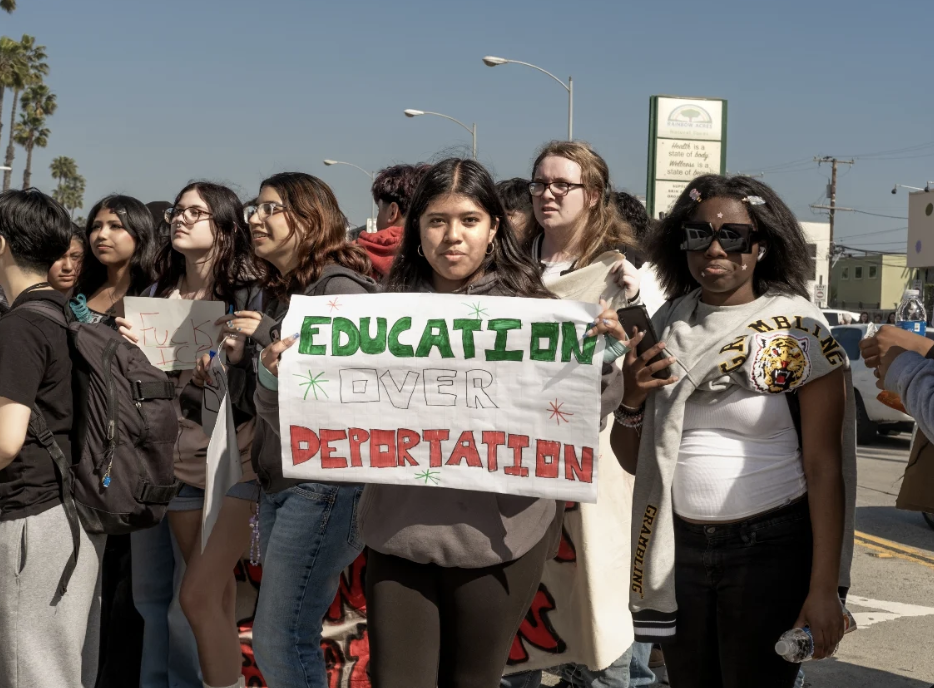Community volunteers and educators are urgently patrolling Mar Vista schools including Venice High School, Beethoven Elementary, Grandview Elementary, and Mark Twain Middle School, as well as dozens of other campuses across the Westside “Four Corners” region to protect students and families from potential ICE raids. This daily effort, led in alliance with West Los Respuesta Rápida and supported by teachers and UTLA, has grown organically out of necessity, connecting trusted school insiders directly with the families most at risk.
The patrols came together quickly the week before school resumed this fall, with volunteers putting together lists of friends, colleagues, and advocates and getting on the phone almost every day that week. They formed teams who patrol on foot and in vehicles before and after school, respond quickly, assess suspicious vehicles, and circulate Know Your Rights materials. “Our goal was to ask schools what they needed and where we could plug in,” said Micaela, a volunteer with West Los Respuesta Rápida and a UCLA PhD student focused on immigrant and refugee education. She added that first-hand knowledge from teachers shapes patrol routes and timing. “Teachers gave us very specific instructions about where they wanted us to patrol based on where the students typically hang out before school and where they might go after school . . . teachers have all the knowledge.”
The effort now spans more than 35 schools, with networks coordinated by frequent Signal chats, a living database of contacts, and daily debriefs. Relationships vary by site, with some principals deeply supportive and others more hesitant. Micaela emphasized that “the best people to develop relationships with at the beginning are teachers, whose number one priority is to keep the community safe.”
Patrollers aim to build trust and ensure visibility, sometimes wearing red at the request of union organizers or handing out flyers marked with the West Los Respuesta Rápida logo. “We do want to be visible, but we don’t want to be threatening,” Micaela said. All volunteers are trained to photograph and document possible government vehicles, drawing on collective patrolling experience in group chats to assess whether agents might be ICE, LAPD, or other officials, and double-checking license plates against group records. “There’s always someone in the chat responding to requests for verification,” she said, and “folks have done an incredible job collecting information to support our efforts.” Organizers report widespread gratitude from educators and parents alike.
In the early stages of the school patrols, outreach to the surrounding community has played a key role. Especially during walking patrols, and sometimes even during car patrols, volunteers stop to walk and distribute flyers and business cards, including the rapid response hotline number. This outreach is designed to mobilize neighbors and families immediately around the schools to help build a stronger protective barrier, making patrolling and community safety a shared effort.
Part of the urgency comes from the gap between LAUSD district messaging and on-the-ground concerns. The district requires strict steps if ICE comes onto campus or is rumored nearby, as described in school site protocols circulated recently. Administrators must immediately notify their region, call school police, document the agent’s badge, demand paperwork, and wait for direction before responding. In emergencies, administrators are expected to comply but always report quickly up the chain, triggering crisis protocols and legal scrutiny. But volunteers point out that these steps can also delay community warning and create confusion. For example, when messages about ICE presence at one school went out this month, parents and staff scrambled for answers before official verification arrived.
The need to protect students and families in Mar Vista and the wider Westside has intensified amid the current political climate. While immigration enforcement actions originate from the federal level, local leaders still hold considerable power to influence outcomes. Critiquing the city’s response, Micaela urged city officials to “have a bit more of a backbone and actually uphold the city as a sanctuary city.” Micaela emphasized that “anyone in any position of power across the city needs to do more, because the language has been too soft, or non-existent. She explained that local Councilmember Traci Park’s opposition to LA’s sanctuary policies “sends a clear message . . . that this isn’t a priority. She doesn’t care. She doesn’t think this is important, and she wants to keep cozying up to law enforcement to stay in power rather than actually helping the community. I think this is cowardly, and she could make a very big difference.” She added that taking a strong stand on behalf of community members “could mobilize more white, affluent, and privileged communities who are not getting involved,” underscoring the critical need for stronger local advocacy to protect schools and families.
To sustain and expand these vital patrols, more community members are needed. Whether you have time to walk the campuses, help with outreach, or provide support behind the scenes, every contribution matters. Click here to get involved with this effort to keep local schools safe.

